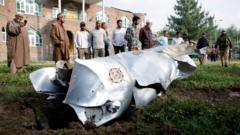The ongoing disputes between India and Pakistan have been reignited following a brutal terrorist attack in Kashmir last month, resulting in the deaths of 26 civilians, primarily Hindus, amidst accusations and military strikes. A group known as the Resistance Front claimed responsibility, which India alleges serves as a front for more comprehensive terrorist activities linked to Pakistan. The Indian government has intensified military operations, targeting groups including Lashkar-e-Taiba, previously implicated in deadly attacks such as the 2008 Mumbai massacre. Meanwhile, Pakistan contends that these organizations have been banned and denies any involvement, further complicating the already strained relations between the two nuclear-armed neighbors.
Escalation of India-Pakistan Tensions Following Terrorist Attack

Escalation of India-Pakistan Tensions Following Terrorist Attack
Recent violence in Kashmir has heightened tensions between India and Pakistan, with both nations exchanging accusations regarding terrorism.
While the Indian government maintains that terrorist factions linked to Pakistan are responsible for violent incidents in Kashmir, Islamabad insists these groups were outlawed long ago. The founder of Lashkar-e-Taiba, Hafiz Saeed, remains a controversial figure, as he is frequently said to lead covert operations from within Pakistan. With both nations standing firm on their points of view, the cycle of retaliation and denials continues, deepening the insecurity surrounding Kashmir—a region long marred by conflict and strife.


















